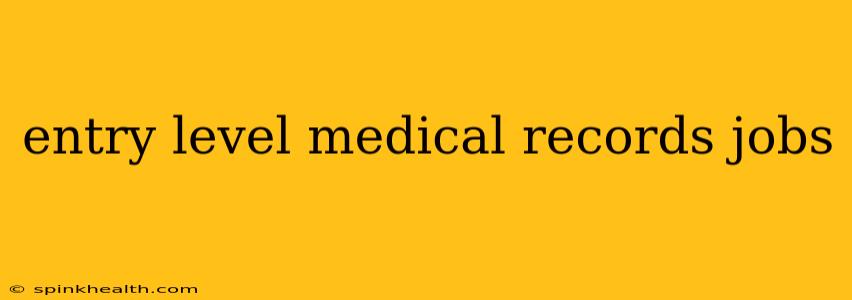The world of healthcare is vast and complex, but behind every doctor's diagnosis and treatment plan lies a crucial element: meticulous medical records. These records are the backbone of patient care, and professionals dedicated to their accuracy and organization are in high demand. If you're looking for a fulfilling career with a solid foundation in healthcare, entry-level medical records jobs could be your perfect fit. But where do you begin? Let's unravel the mystery and explore the exciting opportunities awaiting you.
My name is Sarah, and I've been working in medical records for over 10 years, starting just like you – at the entry level. I've seen firsthand the rewarding aspects of the job and the various pathways you can take. This guide is based on my personal experience and insights, aiming to equip you with the knowledge you need to navigate your journey into this field.
What Does an Entry-Level Medical Records Job Entail?
Entry-level positions typically focus on the foundational aspects of medical record management. Don't expect to be performing complex analyses or making critical clinical decisions right away. Instead, you'll be learning the ropes, gaining invaluable skills, and building a solid understanding of healthcare information systems. Here are some common responsibilities you might encounter:
- Data Entry: This forms a core part of most entry-level roles. You'll be responsible for accurately inputting patient information, diagnoses, treatments, and other relevant details into electronic health record (EHR) systems. Precision and attention to detail are paramount.
- Chart Preparation and Maintenance: This could involve organizing physical charts, scanning documents, and ensuring that all necessary information is readily available. You might also be responsible for maintaining the integrity of both physical and digital records.
- Medical Record Retrieval: Responding to requests for specific patient information, adhering to strict confidentiality protocols and regulations (like HIPAA).
- Release of Information: Processing requests for medical records, ensuring compliance with legal and ethical guidelines.
- Data Reconciliation: Identifying discrepancies and ensuring consistency across different data sources.
What Skills Do I Need for Entry-Level Medical Records Jobs?
While formal qualifications are helpful, many entry-level jobs value a combination of soft skills and technical aptitude.
- Attention to Detail: This is non-negotiable. Accuracy is paramount in medical records, and even a small error could have significant consequences.
- Computer Proficiency: Familiarity with common software applications (like Microsoft Office Suite) and EHR systems is essential.
- Organization and Time Management: Managing multiple tasks simultaneously, meeting deadlines, and staying organized are critical skills.
- Confidentiality and Discretion: Handling sensitive patient information requires the utmost professionalism and respect for privacy.
- Communication Skills: You’ll be interacting with various healthcare professionals, so clear and effective communication is crucial.
What Education or Certification Do I Need?
While a college degree isn't always mandatory for entry-level positions, it can certainly give you a competitive edge. A degree in health information management (HIM), medical records technology, or a related field can significantly improve your job prospects.
Additionally, certifications such as the Registered Health Information Technician (RHIT) or Registered Health Information Administrator (RHIA) demonstrate a commitment to the field and enhance your credentials.
What are the Different Types of Entry-Level Medical Records Jobs?
The medical records field is surprisingly diverse. Here are a few examples:
- Medical Records Clerk: This is a common entry-level role focusing on data entry, file management, and record retrieval.
- Health Information Technician: Often requires some level of education or certification and involves more complex tasks, such as data analysis and quality control.
- Medical Records Assistant: Duties often include a combination of clerical tasks and assisting senior medical records staff.
How Much Can I Expect to Earn in an Entry-Level Position?
Salaries vary significantly based on location, experience, and employer. However, you can expect a competitive starting salary that provides a solid foundation for career advancement.
What is the Career Progression in Medical Records?
Entry-level positions often serve as stepping stones to more advanced roles. With experience and further education/certification, you could progress to positions such as:
- Supervisory Roles: Leading teams and overseeing departmental operations.
- Coding Specialist: Assigning medical codes to diagnoses and procedures.
- Release of Information Specialist: Managing the release of patient information.
- Health Information Manager: Overseeing the entire medical records department.
Embarking on a career in medical records is a journey filled with opportunities for growth, development, and making a real difference in the lives of patients. Remember, starting at the entry level is perfectly acceptable and often the best way to gain experience and learn the intricacies of this crucial healthcare field. Embrace the learning process, focus on your skills, and you'll be well on your way to a rewarding and successful career.

